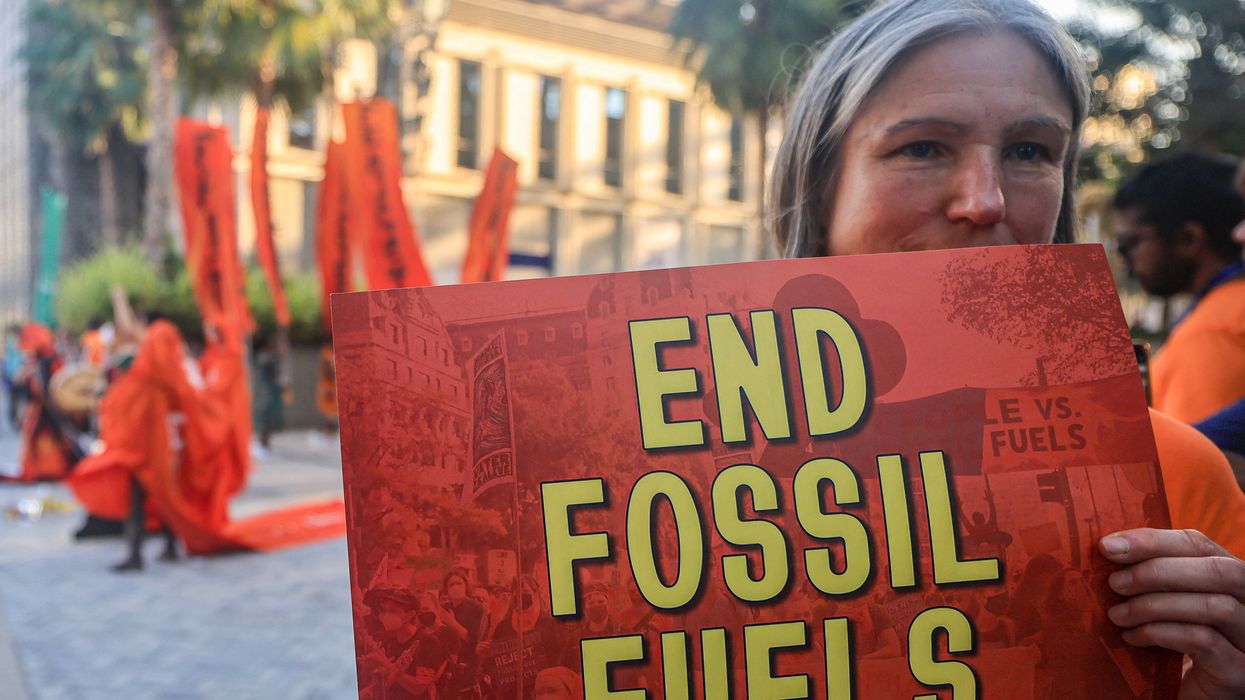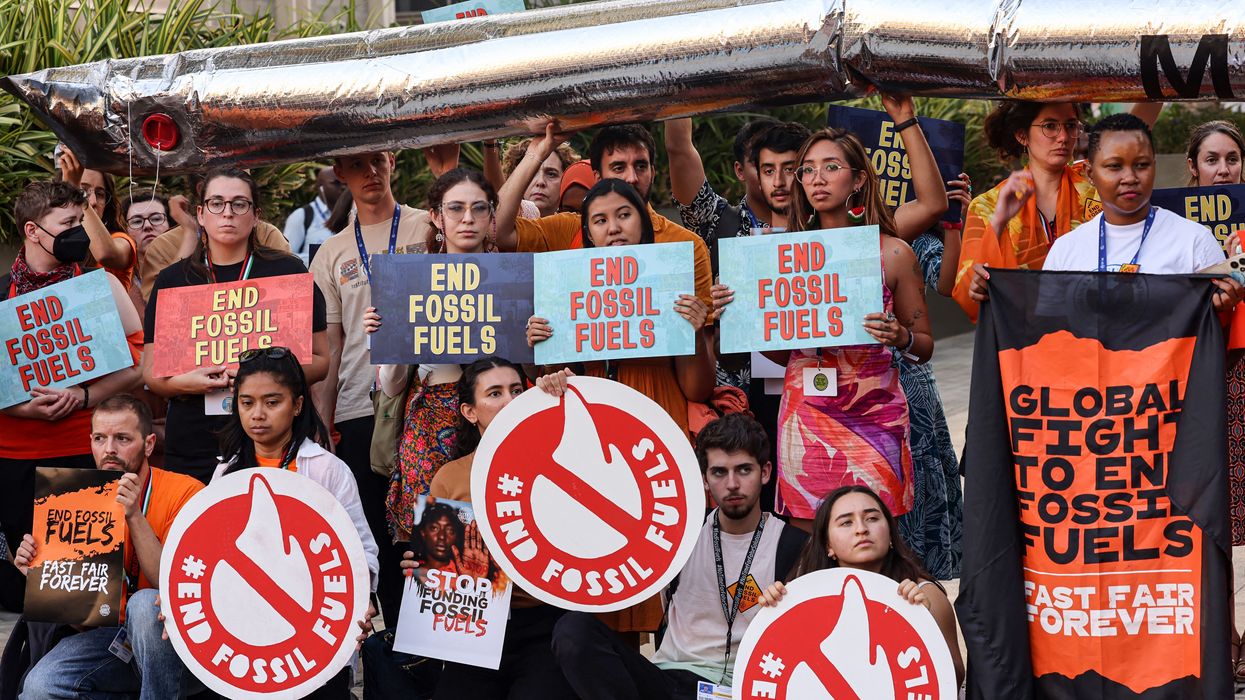'Crunch Time at COP28': Latest Draft Still Has Loopholes, Omits 'Just' Fossil Fuel Phaseout
As the newest Global Stocktake draft was released, an OPEC letter showed oil-producing companies are fearful that the world is getting closer to phasing out fossil fuels.
Reviewing the latest draft of the Global Stocktake regarding the climate emergency out of the 28th United Nations Climate Change Conference, campaigners on Friday noted that negotiators left in numerous loopholes that would allow the fossil fuel industry to continue polluting, while eliminating one option for a clause that appeared to call for a just transition toward renewable energy.
The new draft is the result of three more days of negotiations since the last version of the Global Stocktake (GST) was released on Tuesday, when advocates warned policymakers appeared insistent on including a call for "abatement" of fossil fuel emissions—meaning further development of carbon capture and storage (CCS) technologies, which have so far failed to deliver the emissions-reduction results promised by proponents.
The latest version of the document includes four options for a paragraph that would address the future of fossil fuel use in the remaining years of this decade.
The options that remain in the draft are:
- A phaseout of fossil fuels in line with best available science;
- A phasing out of fossil fuels in line with best available science, the Intergovernmental Panel on Climate Change's 1.5°C pathways and the principles and provisions of the Paris agreement;
- A phaseout of unabated fossil fuels recognizing the need for a peak in their consumption in this decade and underlining the importance for the energy sector to be predominantly free of fossil fuels well ahead of 2050; and
- No text regarding changes to fossil fuel use.
"There is some good stuff in there, but still too many dangerous distractions," said 350.org on social media. "We must agree [to] a fair and fast phaseout of fossil fuels and to triple renewable energies by 2030!"
The draft suggested that many policymakers remain committed to calling for a phaseout of "unabated" fossil fuel emissions—those that are not "captured" and stored underground or under the seabed before they hit they atmosphere.
As Common Dreams reported Friday, more than 470 lobbyists representing carbon capture and storage interests and companies are in attendance at COP28—along with more than 2,400 lobbyists for the fossil fuel industry, which has openly supported CCS as a solution that would allow oil, gas, and coal giants to continue operating.
Rachel Cleetus, policy director and lead economist for the Union of Concerned Scientists' Climate and Energy Program, said world leaders must take their "historic opportunity to secure a global agreement to phase out fossil fuels in line with what the science shows is necessary to meet critical climate goals."
"It's crunch time at COP28," Cleetus told Common Dreams. "The latest draft of the Global Stocktake text includes several potential options, with varying degrees of ambition. Now, it's time to reach consensus on a final outcome that is true to the science, includes near- and long-term benchmarks, has no loopholes, and has an equitable provision of finance to drive a clean energy transition. Countries must take bold action and rise above narrow self-interest and zero-sum political games, as well as the influence of fossil fuel companies, to deliver what people around the world urgently need as climate impacts rapidly worsen."
"The time is now, and the place is Dubai, to finally address the root cause of this global crisis: fossil fuels," said Cleetus.
Oil Change International global policy manager Romain Ioualalen said the latest draft left him hopeful that the world has "never been closer to an agreement on a fossil fuel phaseout."
"What that transition will look like will be a fierce battle over the next few days," said Ioualalen. "We are alarmed about some of the options in this text that seem to carve out large loopholes for the fossil fuel industry. These will need to be opposed. The draft is also missing a clear recognition that developed countries will need to phase out faster and provide their fair share of finance, as well as a recognition that the decline of fossil fuel production must start immediately, not in the distant future."
Ghiwa Nakat, executive director of Greenpeace MENA, said the latest draft and "everything so far" at COP28 "has been just a prelude to what we really want to hear—commitment to a just and equitable phaseout of all fossil fuels by mid-century, coupled with key milestones for this critical decade."
While "alternative formulations on fossil fuel phaseout" have never "made it this far into a draft text," said Greenpeace International, "there are still no guarantees on a decision on fossil fuels, so all is in play."
Shortly after the draft was made public, letters from the Organization of the Petroleum Exporting Countries (OPEC) were leaked to multiple news outlets and made it even more clear that campaigners' fight for a strong final Global Stocktake is not over—but that major fossil fuel producers are growing concerned that COP28 could be a turning point for the industry.
The letters, dated December 6 and signed by OPEC secretary-general and Kuwaiti oil executive Haitham al-Ghais, were sent to members countries including Saudi Arabia, Iran, and Nigeria.
Al-Ghais urged the countries to "proactively reject any text or formula that targets energy, i.e. fossil fuels, rather than emissions."
"These letters show that fossil fuel interests are starting to realize that the writing is on the wall for dirty energy," Mohamed Adow, director of Power Shift Africa, toldThe Guardian. "Climate change is killing poor people around the globe and these petrostates don't want COP28 to phase out fossil fuels because it will hurt their short-term profits. It's shameful."
While the draft text "offers hope with several options for a phaseout of fossil fuels," said Cansın Leylim, associate director of global campaigns for 350.org, fossil fuel lobbyists are still "trying to block progress" at COP28.
"OPEC needs to get with the program or move out of the way of our just transition to a 100% renewable energy powered future," said Leylim. "The spotlight is now on the COP28's presidency and if they will broker a deal for a just transition or instead align themselves with the oil industry."

